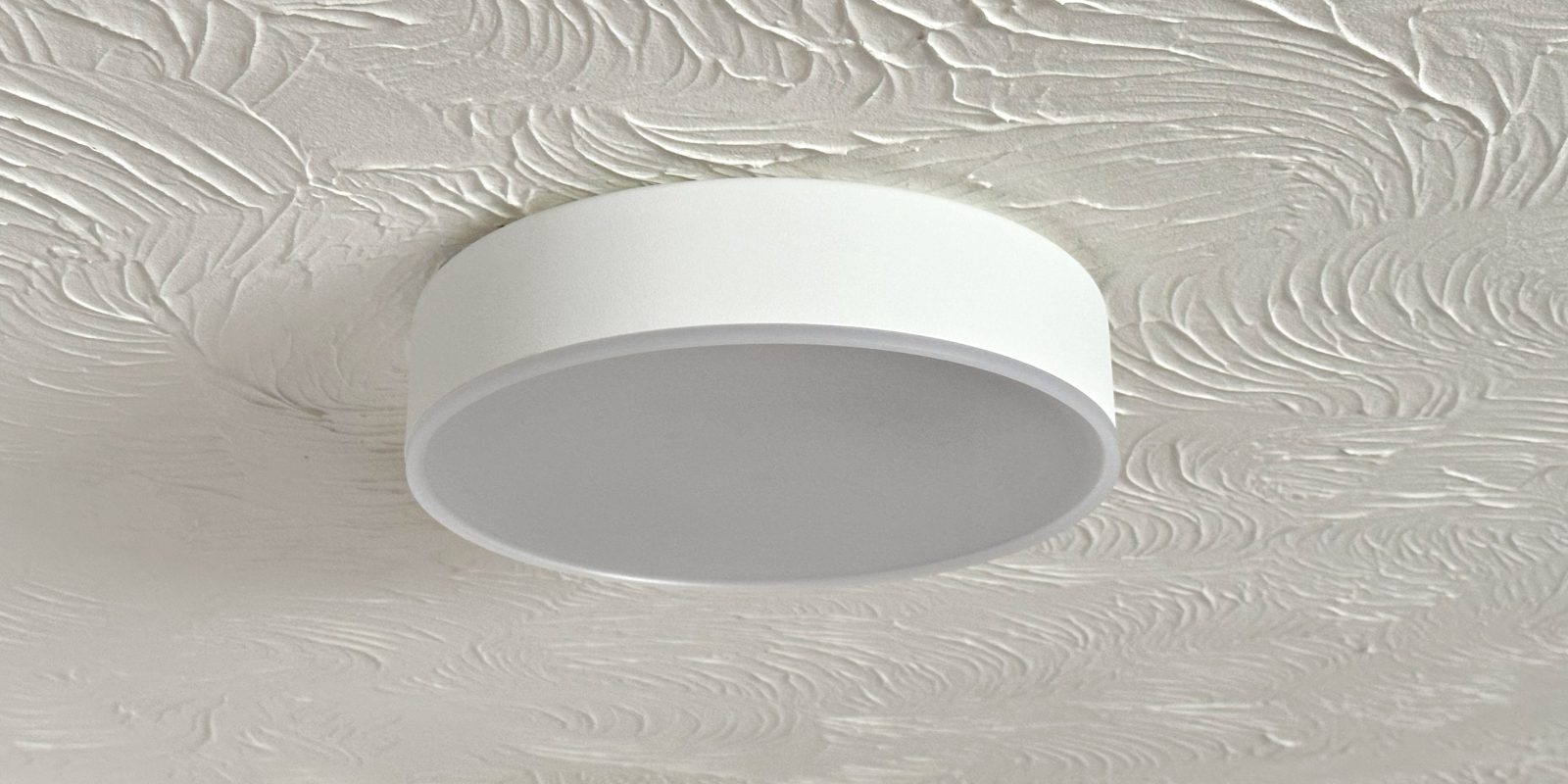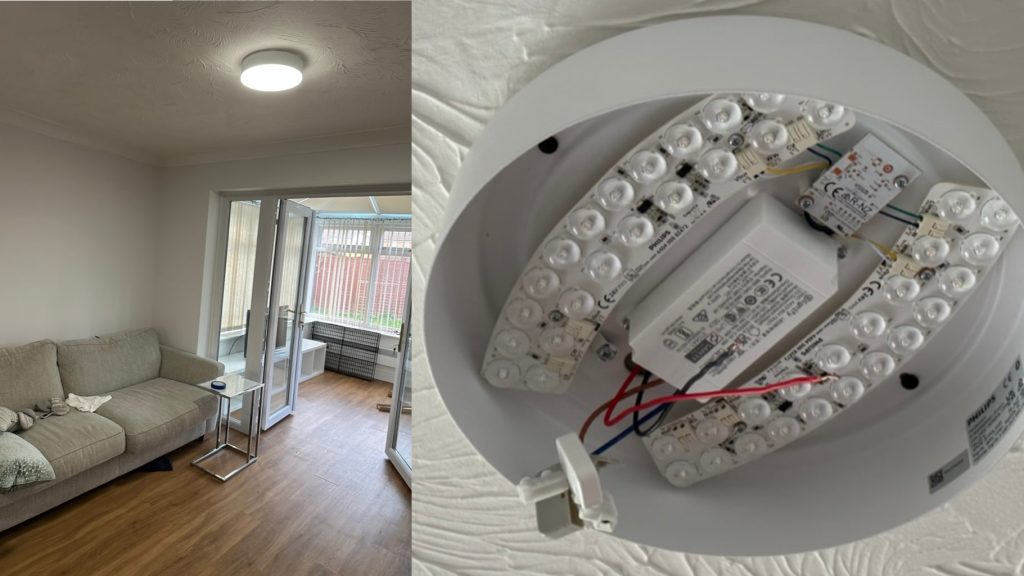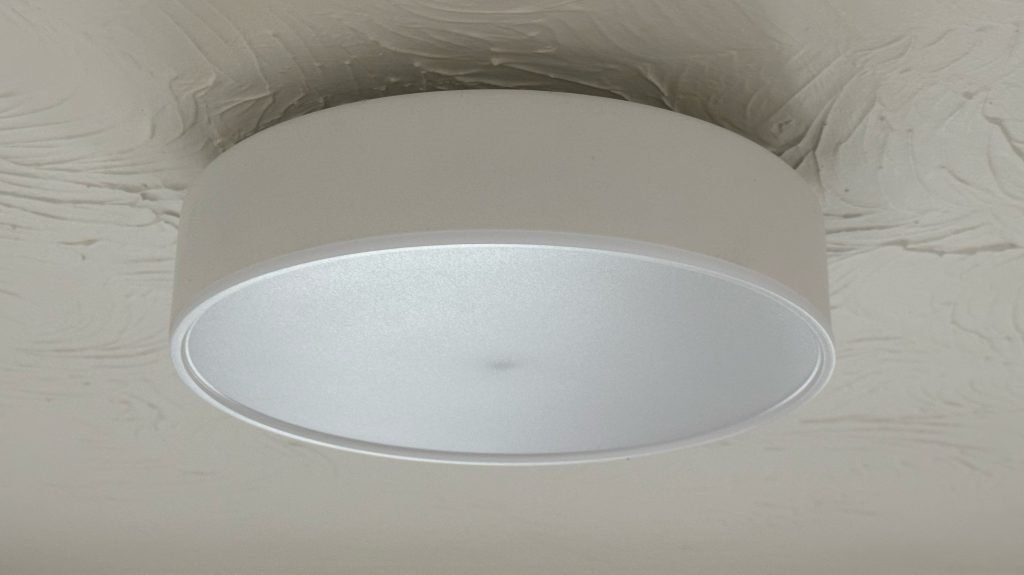
The Philips Hue Enrave is a sleek, nondescript, ceiling light that will fit it into most home decor while also giving your room the perks of smart home living. Read on for some hands-on impressions in my Enrave review …
Design
What I wanted for my living room was an LED ceiling light that was low profile and nondescript. I didn’t want the lights to make a statement. The Enrave design fits the bill as it sits only a few inches off the ceiling, and is relatively featureless in appearance, with a simple circular shape covered by a plain white plastic diffuser.
As long as you can nail it into something solid, it can be fitted flush to the ceiling, protruding about six inches total.

Internally, the Enrave houses two strips of LEDs. When covered by the diffuser, it produces even light distribution across the surface.
The Enrave is part of Hue’s ‘White Ambiance’ collection which means you can adjust the color temperature from a warm white to a cool white (yellow or bluer tinge), but it does not have arbitrary RGB control. I’ve personally never found a practical use for multicolored smart lights — the novelty wears off fast — so this didn’t bother me at all. Being able to arbitrarily dim the brightness is all I care about, and the Enrave is great at that.
My only real complaint with the unit’s appearance is the quality control on the diffuser. The very center of the plastic has a molding artifact, almost like a nodule where the curvature is lost. This is visible in certain conditions, such as when the light itself is turned off but sunlight is refracting in the room. It would be nicer if Philips could have manufactured the diffuser so it didn’t have this defect.

Also note that when the light is on, there is some minor orthogonal light leakage to be aware of. But the opaque sides mean most of the ceiling will remain in darkness, as the light is directed at the room below. If you are looking for a light that also has the effect of lighting up the ceiling, this design is not for you.
Different sizes of Enrave for different rooms
If you are buying in, please be aware of the size of your room. There are several different models of Enrave light with varying diameters for varying amounts of light output. The smallest Enrave models are meant for small rooms like bathrooms or utility rooms, whereas the bigger ones will emit enough light to cover living spaces.
- Enrave small: 26cm diameter, 1220 lumens
- Enrave medium: 38cm diameter, 2450 lumens
- Enrave large: 42.5cm diameter, 4300 lumens
Before you buy, I would recommend cutting out circles of paper that match the diameters of the lights and sticking them on the ceiling with tape, just so you can better visualize the aesthetics and see whether the wide white round shape would dominate the space too much.
In my case, the ceiling already had two light fittings in it, roughly evenly spaced across the ceiling. So I ended up opting for two of the Enrave small modules, the combination of which amply covers the 120ft(approx) room size.
In HomeKit, I simply grouped these accessories together so they appear as a single light control. Read my previous coverage of the Wall Switch Module to see how I can control the Enrvae ceiling lights using a standard light switch on the wall, in addition to HomeKit control through the Home app and Siri voice commands.
Why Hue?
I have generally found Philip Hue’s products to be well-built, long-lasting and responsive when it comes to smart home control. The HomeKit integration via the Hue bridge is very solid, and I rarely if ever experience a ‘no response’ failure from Siri, something that happens intermittently with cheaper brands. Response times are also very good.
As far as dimmable LEDs go, it is hard to find ones that perform better than the quality bulbs used inside Hue products. Other dimmable LED bulbs I’ve tried (paired with something like a smart dimmer light switch) simply do not offer the same range of brightness. On Hue, the changing gradations are very smooth with differing levels of brightness for what feels like every percentage point on the slider in the app. On other cheaper brand LED bulbs, I’ve found you can only dim by about a third of the range before the lights simply turn off.
Longevity is also a factor. I haven’t had any of my Hue lights fail so far, some of which I’ve had for many years. In contrast, I’ve had several store brand LED bulbs die on me.
That being said, there is no hiding from the fact that Hue products are exorbitantly expensive, arguably a bit overpriced for what they are. But as I was putting new ceiling lights in my main living area, and so I didn’t mind paying for the best, and fitting the Enrave lights. In rooms that are less important to daily living, I use cheaper smart home gear (or none at all). What’s nice about HomeKit is the flexibility it allows you to mix and match brands like that.
Follow Benjamin Mayo @bzamayo on Mastodon, Threads, and Twitter.
Add 9to5Mac to your Google News feed.
FTC: We use income earning auto affiliate links. More.






